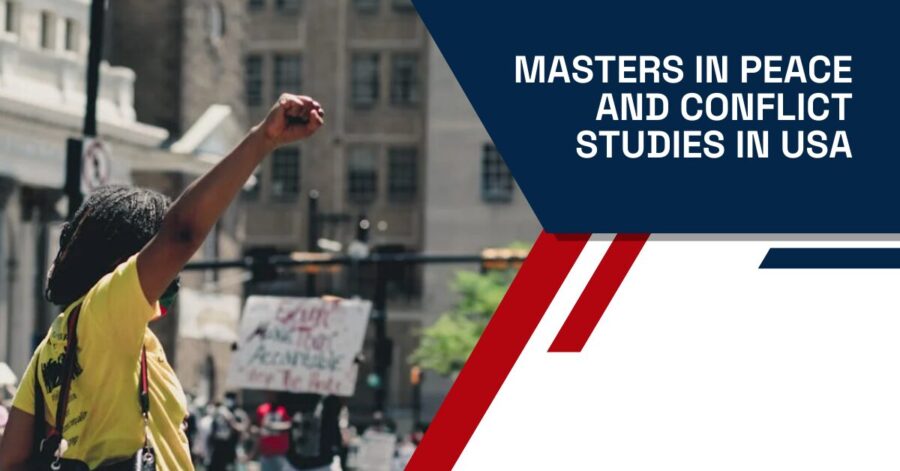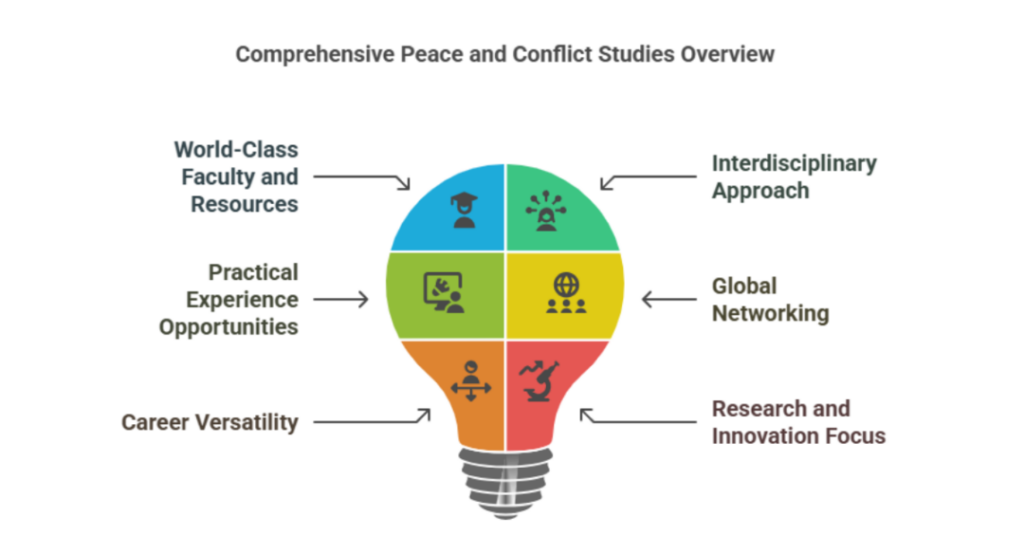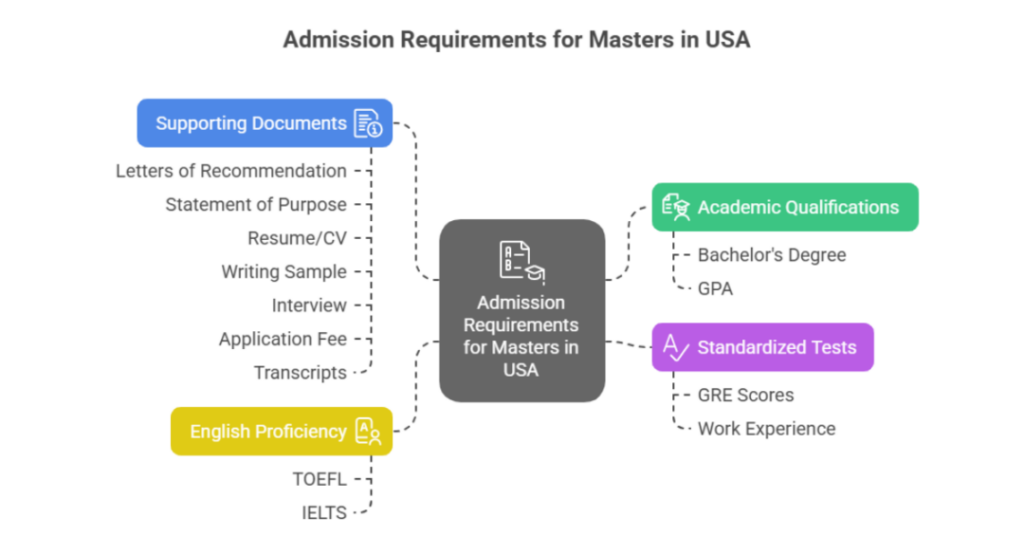26 May 2025
7 minutes read
Everything Indian Students Need To Know About Masters In Peace And Conflict Studies In USA

Key Takeaways
- A Masters in Peace and Conflict Studies in USA equips students with practical skills in conflict resolution, global diplomacy, and peacebuilding.
- Top universities like Harvard, Notre Dame, and George Mason offer interdisciplinary programs, with scholarship options easing high tuition and living costs.
- Graduates find diverse roles in NGOs, foreign services, research, and policy—making the degree ideal for Indian students seeking global impact.
You won’t believe this, but conflict is a billion-dollar industry. From international peace talks to corporate disputes, the world runs on conflicts. The problem? Too many people dive into peace studies with good intentions but end up in a maze of theory, struggling to land impactful jobs.
A Master of Arts in Peace and Conflict Studies Specialization (M.A.) isn’t just about studying history, it’s about mastering conflict resolution, mediation, and conflict management through specialized coursework and real-world conflict analysis. This interdisciplinary studies program blends political science, peace and justice, and peacebuilding, creating alumni who drive real change
What Is a Masters in Peace and Conflict Studies All About?
A Master’s Degree in Peace and Conflict Resolution in the USA is designed to help students understand the causes of conflict and develop strategies for conflict transformation and dispute resolution. These graduate programs focus on practical solutions to violent conflict through applied conflict research and conflict resolution processes.

Leading institutions like American University, George Mason University, Kent State University, the University of Notre Dame, and Nova Southeastern University offer top-tier peace and conflict studies programs, equipping students with knowledge and skills to drive social change and promote sustainable peace.
These graduate schools provide a learning experience that blends international peace and conflict resolution theories with practical academic studies. Students in a Master’s Degree in Peace and Reconciliation program engage in negotiation and conflict resolution, international conflict resolution, and peace operations while learning from peace prize winners and experts in the field.
Universities such as the University of North Carolina, the University of Maine, and University of Massachusetts offer programs in peace and conflict that prepare students for roles in social services, governments, and corporations.
6 Reasons To Pursue A Masters in Peace and Conflict Studies in the USA?
The United States is home to over 4,000 colleges and universities, offering a diverse and robust higher education landscape. This rich academic environment makes the USA an ideal destination for pursuing specialized studies, particularly in fields addressing global challenges.
Here are 6 reasons to pursue a Masters in Peace and Conflict Studies in the USA:
World-class faculty and resources
Conflict studies in USA benefit from leading experts in the field. Programs offer access to cutting-edge research and extensive libraries. Students gain insights from practitioners with real-world experience in conflict resolution.
Interdisciplinary approach
Peace and conflict studies programs integrate various disciplines. This approach provides a comprehensive understanding of complex global issues. Students develop a well-rounded skill set that goes beyond a typical bachelor’s degree.
Practical experience opportunities
Masters in peace programs often include internships and fieldwork. These experiences allow students to apply theoretical knowledge to real conflicts. Hands-on learning enhances skills in conflict analysis and resolution.
Global networking
USA programs attract a diverse international student body. This environment fosters cross-cultural understanding and global connections. Networking opportunities extend beyond the undergraduate degree experience.
Career versatility
A masters in peace and conflict studies opens doors to various careers. Graduates work in NGOs, government, education, and international organizations. The program offers versatile knowledge and skills applicable in many sectors.
Research and innovation focus
USA programs emphasize original research on causes of conflict. Students contribute to the development of new approaches for sustainable peace. This research focus prepares graduates to be thought leaders in the field.
10 Top Universities For Masters In Peace and Conflict Studies In USA
Masters in Peace and Conflict Studies programs in the USA offer a unique blend of theoretical knowledge and practical skills essential for addressing global challenges. These programs, available at some of the nation’s top universities, equip students with expertise in analysis of conflict, mediation, and sustainable peacebuilding.
Here are top 10 universities in the USA, known for their programs in Peace and Conflict studies:
| University | QS Ranking | Average Fees (USD/year) | Average Salary (USD/year) |
|---|---|---|---|
| Harvard University | 1 | 51,000 | 75,000 |
| Columbia University | 19 | 48,000 | 72,000 |
| University of Notre Dame | 265 | 55,000 | 68,000 |
| Georgetown University | 248 | 53,000 | 70,000 |
| American University | 801-1000 | 32,000 | 65,000 |
| George Mason University | 801-1000 | 35,000 | 63,000 |
| University of Denver | 701-750 | 54,000 | 62,000 |
| Duke University | 50 | 58,000 | 73,000 |
| Tufts University | 252 | 56,000 | 69,000 |
| Johns Hopkins University | 25 | 57,000 | 74,000 |
What Are The Admission Requirements For Masters In USA?
One common challenge that everybody faces – probably you might also have, is meeting the diverse and often stringent requirements set by top universities. Many applicants struggle with standardized tests like the GRE, which can be particularly scary for non-native English speakers.
Additionally, gathering all necessary documents and meeting application deadlines while managing current academic or professional commitments can be stressful.

To help clarify the typical requirements, here’s a detailed breakdown of admission criteria:
| Requirement | Details |
|---|---|
| Bachelor’s Degree | A completed undergraduate degree, preferably in a related field such as political science, international relations, or sociology. |
| GPA | Usually a minimum of 3.0 on a 4.0 GPA scale, though top programs may require higher. |
| GRE Scores | Often required, with competitive scores varying by program. Some may waive for applicants with significant work experience. |
| English Proficiency | TOEFL (minimum 80-100) or IELTS (minimum 6.5-7.0) for non-native English speakers. |
| Letters of Recommendation | Typically 2-3 letters of recommendation or professional references. |
| Statement of Purpose | A well-crafted statement of purpose outlining academic interests, career goals, and reasons for pursuing the program. |
| Resume/CV | Detailing academic, professional, and relevant volunteer experiences in resume personal statement. |
| Writing Sample | Some programs require an academic writing sample to assess research and analytical skills. |
| Interview | Select programs may require an interview, either in-person or virtual. |
| Application Fee | Varies by institution, typically ranging from $50 to $150. |
| Transcripts | Official transcripts from all previous post-secondary institutions attended. |
| Work Experience | Some programs prefer or require relevant work or internship experience. |
What Is The Cost Structure To Pursue A Masters In USA?
May be not all but few students face substantial living expenses, especially in cities with a high cost of living. Another issue is the lack of sufficient funding opportunities, leaving many reliant on personal savings or student loans.
Furthermore, international students must navigate visa and health insurance costs, which add to the financial burden. Finally, fluctuating currency exchange rates can unpredictably impact overall expenses.
Here’s a breakdown of the typical costs associated with pursuing a master’s degree in the USA:
| Cost Component | Description | Estimated Cost (per year) |
|---|---|---|
| Tuition Fees | Fees vary by institution, program, and residency status | $20,000 – $60,000 |
| Living Expenses | Includes rent, utilities, food, and transportation | $10,000 – $20,000 |
| Health Insurance | Mandatory for international students | $1,000 – $3,000 |
| Books and Supplies | Course materials and other academic necessities | $1,000 – $2,000 |
| Visa and SEVIS Fees | Costs for student visa and SEVIS registration | $300 – $500 |
| Application Fees | Fees for university applications and standardized tests | $500 – $1,500 (total) |
| Miscellaneous | Personal expenses and other incidental costs | $2,000 – $4,000 |
Scholarships and Funding Opportunities for Masters of Arts in Peace and Conflict
Pursuing peace studies and conflict resolution at the graduate level can be both academically rewarding and financially demanding. Fortunately, many universities in the US and global organizations offer scholarships and assistantships specifically for students in international peace studies, conflict resolution graduate programs, and peace and conflict studies institutes.
These funding options not only support tuition and living expenses but also provide learning opportunities such as fieldwork, research fellowships, and assistantships in renowned institutes like the Keough School of Global Affairs, the School of Peace Studies, and the College of Arts.
Here’s a comprehensive table of scholarships, fellowships, and grants tailored to students applying for studies in USA, especially in conflict analysis and management, negotiation and conflict, professional studies, and online masters in this field:
| Scholarship / Grant | Institution / Organization | Eligible Programs | Funding Type | Key Highlights |
|---|---|---|---|---|
| Keough Fellowship | Keough School of Global Affairs, University of Notre Dame | Master of Global Affairs – International Peace Studies | Full tuition + stipend | Designed to prepare students for leadership in peacebuilding |
| American University Peace Scholarships | School of International Service, American University | MS in Conflict Analysis, Conflict Management and Resolution | Partial to full tuition | For graduate students focused on international peace studies |
| Fulbright Foreign Student Program | U.S. Department of State | Any graduate-level degree program | Tuition + living + travel | Available to students from around the world pursuing studies in the US |
| Rotary Peace Fellowship | Rotary International | Master’s in Peace Studies Program at selected universities | Full tuition, room, and board | Focuses on conflict resolution and peace studies |
| Joan B. Kroc Peace Fellowship | Joan B. Kroc School of Peace Studies, University of San Diego | MA in Peace and Justice | Full tuition | Program teaches students practical peacebuilding strategies |
| Abilene Christian University Scholarships | Abilene Christian University | MS in Negotiation and Conflict Resolution | Varies | Offers online masters with flexible formats for professionals |
| California State University Graduate Fellowships | California State University System | Peace and Conflict Studies Institute programs | Need-based | Open to both on-campus and online graduate students |
| Boren Fellowships | National Security Education Program (NSEP) | Graduate Certificate and degree programs in global affairs | Up to $25,000 | Promotes long-term international peace and cooperation |
| Peace and Conflict Transformation Grant | United States Institute of Peace (USIP) | Conflict Resolution Graduate Research Projects | Research funding | For students engaging in applied conflict resolution work |
| Conflict Resolution Graduate Assistantships | University of Massachusetts Boston | MS in Conflict Resolution | Tuition waiver + stipend | Program is an interdisciplinary degree focused on conflict analysis |
Career Opportunities After a Masters Program in Peace and Conflict Resolution
For Indian students, a Masters in Peace and Conflict Studies in USA opens doors to global careers in peacebuilding, diplomacy, policy, and humanitarian work.
Studies graduates gain skills in negotiation, conflict analysis, and international development, making them valuable in both public and private sectors.
| Job Role | Description | Where You Can Work |
|---|---|---|
| Conflict Resolution Specialist | Facilitates dialogue and negotiation to resolve disputes in communities, organizations, or international settings. | NGOs, UN Missions, Government Departments |
| Humanitarian Affairs Officer | Coordinates relief operations and ensures humanitarian laws are upheld in crisis zones. | International NGOs, Red Cross, UNHCR |
| Policy Analyst (Peace & Security) | Researches, evaluates, and recommends policy for conflict prevention and post-conflict rebuilding. | Think Tanks, Ministries, Peace Research Institutes |
| Program Manager – Peacebuilding | Designs and manages peace-focused development projects in conflict-prone regions. | World Bank, USAID, CARE International |
| Diplomat or Foreign Service Officer | Represents national interests while negotiating peaceful solutions in international relations. | Indian Foreign Services (IFS), US State Dept, Embassy Roles |
| Researcher or Academic | Conducts interdisciplinary research in peace studies and teaches at graduate or undergraduate level. | Universities, Peace and Conflict Research Centers |
| Mediation and Negotiation Consultant | Offers conflict management services to businesses, communities, or governments. | Law Firms, Corporate Sector, Consulting Agencies |
| Restorative Justice Coordinator | Manages community-based justice programs focused on healing rather than punishment. | Correctional Programs, Local Governments |
| Monitoring and Evaluation Specialist | Assesses the impact of peacebuilding or conflict resolution projects to improve future interventions. | UNDP, DFID, Nonprofit Foundations |
Conclusion
Ultimately, this field offers a path to meaningful work, addressing some of the most pressing issues of our time. For those dedicated to making a difference, the journey, though challenging, is a step towards a more peaceful world.
Remember, choosing a program involves considering factors like faculty expertise, practical experience opportunities, and the potential for networking. Financial planning is crucial, given the range of expenses from tuition to living costs. Scholarships, assistantships, and other funding options can ease the burden, but preparation is key.
Step onto the path of financial freedom in your educational journey with Ambitio’s Scholarship Finder. Navigate through a plethora of scholarship opportunities to find those that best match your profile, helping you to focus on your studies without financial burden.
FAQs
What is a Masters in Peace and Conflict Studies?
A Masters in Peace and Conflict Studies is an interdisciplinary graduate program focusing on understanding and resolving conflicts, fostering peace, and studying international relations.
Why should I study Peace and Conflict Studies in the USA?
Studying in the USA offers high-quality education, access to diverse international perspectives, and opportunities to learn from top experts in the field.
What are the prerequisites for applying to this program?
Key requirements include an undergraduate degree in a relevant field, a strong academic record, letters of recommendation, and a personal statement or essay.
What kind of career opportunities can I pursue with this degree?
Graduates can work in international organizations, NGOs, government agencies, the private sector, and academia, focusing on conflict resolution, peacebuilding, and policy analysis.
Does the program include practical experiences like internships?
Yes, most programs offer practical experiences through internships or fieldwork, providing hands-on learning and real-world applications.

You can study at top universities worldwide!
Get expert tips and tricks to get into top universities with a free expert session.
Book Your Free 30-Minute Session Now! Book a call now




























